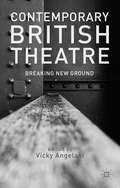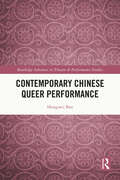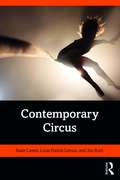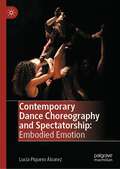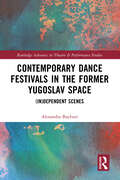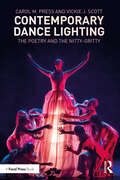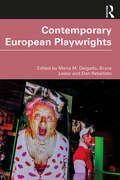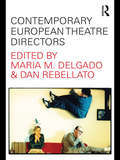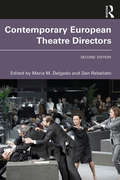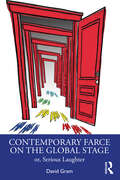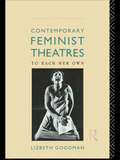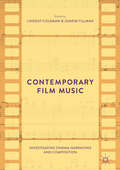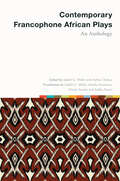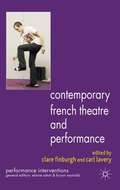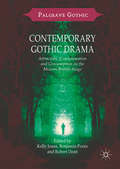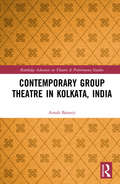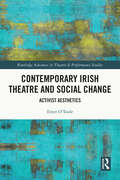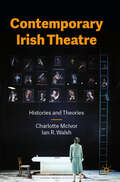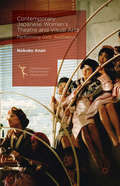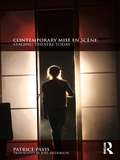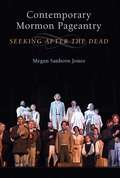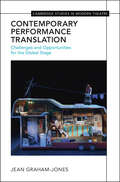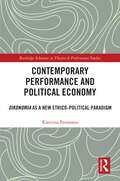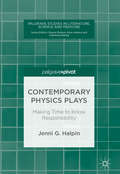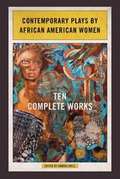- Table View
- List View
Contemporary British Theatre
by Vicky AngelakiThis edited collection brings together a team of internationally prominent academics and delivers cutting-edge discourse on the strongly emerging tradition of experimentation in contemporary British theatre - redefining what the dramatic stands for today. Each chapter of the collection focuses on influential contemporary plays and playwrights.
Contemporary Chinese Queer Performance (Routledge Advances in Theatre & Performance Studies)
by Hongwei BaoIn this ground-breaking study, Hongwei Bao analyses queer theatre and performance in contemporary China. This book documents various forms of queer performance – including music, film, theatre, and political activism – in the first two decades of the twenty first century. In doing so, Bao argues for the importance of performance for queer identity and community formation. This trailblazing work uses queer performance as an analytical lens to challenge heteronormative modes of social relations and hegemonic narratives of historiography. It will be of great interest to students and scholars of theatre and performance studies, gender and sexuality studies and Asian studies.
Contemporary Circus: Conversations With Creators
by Katie Lavers Louis Patrick Leroux Jon BurttIn this volume, twenty-four creators come together with three scholars to discuss Contemporary Circus, bridging the divide between practice and theory. Lavers, Leroux, and Burtt offer conversations across four key themes: Apparatus, Politics, Performers, and New Work. Extensively illustrated with fifty photos of Contemporary Circus productions, and extensively annotated, Contemporary Circus thematically groups and contextualises extracts of conversations to provide a sophisticated and wide-ranging study supported by critical theory. Of interest to both practitioners and scholars, Contemporary Circus uses the lens of ‘contestation,’ or calling things into question, to provide a portal into ways of seeing today’s circus performance. Conversations with: Lachlan Binns and Jascha Boyce (Gravity and Other Myths), Tilde Björfors (Cirkus Cirkör), Kim ‘Busty Beatz’ Bowers (Hot Brown Honey), Shana Carroll (The 7 Fingers), David Clarkson (Stalker), Philippe Decouflé (Compagnie DCA), Fez Faanana (Briefs), Mike Finch (Circus Oz), Daniele Finzi Pasca (Compagnia Finzi Pasca), Sean Gandini (Gandini Juggling), Firenza Guidi (ElanFrantoio, NoFit State Circus), Jo Lancaster and Simon Yates (Acrobat), Johann Le Guillerm (Cirque Ici), Yaron Lifschitz (Circa), Chelsea McGuffin (Company 2), Phia Ménard (Compagnie Non Nova), Jennifer Miller (Circus Amok), Adrien Mondot (Compagnie Adrien M and Claire B), Charlotte Mooney and Tina Koch (Ockham’s Razor), Philippe Petit (high wire artist), and Elizabeth Streb (STREB EXTREME ACTION).
Contemporary Dance Choreography and Spectatorship: Embodied Emotion
by Lucía Piquero ÁlvarezThis book offers an approach which unites choreographic and spectatorial perspectives, and argues for dance itself—its materials, its structures—as a medium of emotional communication. Contemporary dance often seems to contend with issues of understanding, regularly being “read” in “languages” which alienate it. Even if emotion seems a significant part of people’s engagement with dance, its workings are often surrounded by an air of mysticism. Engaging with these issues, this study investigates the experience of emotion in Euro-American contemporary dance theatre. It questions its dependence on the artist’s personal emotions, and the assumption that it is mediated by representational meaning. Instead, this book proposes that the emotional import of dance emerges from an interplay between perceptual properties and symbolic elements in an embodied affective cognitive experience. This experience includes the background of the spectator as well as the context of work, choreographer, performer(s) and other creative agents.
Contemporary Dance Festivals in the Former Yugoslav Space: (in)dependent Scenes (Routledge Advances in Theatre & Performance Studies)
by Alexandra BaybuttThis book expands the understanding of conditions defining the creation and circulation of contemporary dance that differ across Europe. It focuses on festival-making connected with the Balkan regional project ‘Nomad Dance Academy’ (NDA), and highlights collective approaches to sustain a theorisation of festivals using the concepts of dissensus and imperceptible politics. Drawing from anthropological methods, three festivals PLESkavica, Slovenia; Kondenz, Serbia and LocoMotion, North Macedonia, are explored through social, political and historical currents affecting curatorial practice. This book closely follows how festival-makers navigate the values of international development that during and after the Yugoslav wars looked to art as part of peacekeeping and nation-building processes. This coincided with increasing discourse and practices of contemporary dance that gained momentum in the 1980s alongside European festivalisation. I show how contemporary dance acts as an agent for transformation, but also a carrier of older forms of social organisation, reflecting methods and values of Yugoslav Worker Self-management that are deployed by the groups creating the festivals. This book will be of interest to dance scholars as well as researchers tracing the long-term effects of the dissolution of the Socialist Federal Republic of Yugoslavia.
Contemporary Dance Lighting: The Poetry and the Nitty-Gritty
by Carol M. Press Vickie J. ScottContemporary Dance Lighting: The Poetry and the Nitty-Gritty dynamically guides students toward aesthetically, creatively, and skillfully becoming lighting designers for dance in the 21st century. The book is organized in three parts, covering everything from the aesthetic considerations of lighting for dance to the tools and technology designers use to create compelling artistry. Part I, "Beginnings" establishes context, explaining the structure of the book and illuminating the history of contemporary dance and lighting. Part II, "The Poetry" elaborates on the key artistic and aesthetic elements of contemporary dance lighting: visual narrative; controllable functions and qualities of light; use of space, color, and time; importance and intricacies of collaboration; and continual effects and evolution of technology. Part III, "The Nitty-Gritty" steers students through the technical knowledge and skills necessary to design lighting, including understanding your tools and positioning instruments; creating layered light plots; organizing extensive paperwork; and archiving. The dance Artifice, choreographed by Jerry Pearson, is sequentially explored throughout the book to convey key concepts. "Further Reflections" conclude each chapter, written by a diverse group of renowned professionals, inviting young designers directly into the world of lighting design. This textbook is for use in Lighting Design and Design for Dance Lighting courses at the university level, along with professional training programs.
Contemporary European Playwrights
by Maria M. DelgadoContemporary European Playwrights presents and discusses a range of key writers that have radically reshaped European theatre by finding new ways to express the changing nature of the continent’s society and culture, and whose work is still in dialogue with Europe today. Traversing borders and languages, this volume offers a fresh approach to analyzing plays in production by some of the most widely-performed European playwrights, assessing how their work has revealed new meanings and theatrical possibilities as they move across the continent, building an unprecedented picture of the contemporary European repertoire. With chapters by leading scholars and contributions by the writers themselves, the chapters bring playwrights together to examine their work as part of a network and genealogy of writing, examining how these plays embody and interrogate the nature of contemporary Europe. Written for students and scholars of European theatre and playwriting, this book will leave the reader with an understanding of the shifting relationships between the subsidized and commercial, the alternative and the mainstream stage, and political stakes of playmaking in European theatre since 1989.
Contemporary European Theatre Directors
by Maria M. Delgado Dan Rebellato'An invaluable book that we shall all be using for a long time to come' - Michael Billington Contemporary European Theatre Directors is an ambitious and unprecedented overview of many of the key directors working in European theatre over the past fifty years. It is a vivid account of the vast range of work undertaken in European theatre during this period, situated lucidly in its artistic, cultural and political context. The resulting study is a detailed guide to the generation of directors whose careers were forged and tempered in the changing Europe of the 1980s and 1990s. The featured directors are:Calixto Bieito, Piotr Borowski, Romeo Castellucci, Frank Castorf, Patrice Chéreau, Lev Dodin, Declan Donnellan, Kristian Frédric, Rodrigo García, Jan Lauwers, Christoph Marthaler, Simon McBurney, Daniel Mesguich, Katie Mitchell, Ariane Mnouchkine, Thomas Ostermeier, Patrice Pavis, Silviu Purc?rete and Peter Sellars. Travelling from London and Craiova to St. Petersburg and Madrid, the book examines directors working with classics, new writing, and new collaborative theatre forms. Each chapter is written by a specialist in European theatre and provides a detail critique of production styles. The directors themselves provide contributions and interviews to this multi-authored work, which unites the many and varied voices of European theatre in one coherent volume.
Contemporary European Theatre Directors
by Maria M. Edited by DelgadoThis expanded second edition of Contemporary European Theatre Directors is an ambitious and unprecedented overview of many of the key directors working in European theatre over the past 30 years. This book is a vivid account of the vast range of work undertaken in European theatre during the last three decades, situated lucidly in its artistic, cultural, and political context. Each chapter discusses a particular director, showing the influences on their work, how it has developed over time, its reception, and the complex relation it has with its social and cultural context. The volume includes directors living and working in Italy, Germany, France, Spain, Poland, Russia, Romania, the UK, Belgium, Switzerland, and the Netherlands, offering a broad and international picture of the directing landscape. Now revised and updated, Contemporary European Theatre Directors is an ideal text for both undergraduate and postgraduate directing students, as well as those researching contemporary theatre practices, providing a detailed guide to the generation of directors whose careers were forged and tempered in the changing Europe following the end of the Cold War.
Contemporary Farce on the Global Stage: or, Serious Laughter
by David GramContemporary Farce on the Global Stage provides audiences and practitioners a detailed survey of how the genre of farce has evolved in the 21st century. Often dismissed as frivolous, farce speaks a universal language, with the power to incisively interrogate our world through laughter.Unlike farces of the past, where a successful resolution was a given and we could laugh uproariously at adulterous behaviour, farce no longer guarantees an audience a happy ending where everything works out. Contemporary farce is no longer ‘diverting us’ with laughter. It is reflecting the fractured world around us. With a foreword by award-winning playwright Ken Ludwig, the book introduces readers to the Mechanics of Farce, and the ‘Four Ps,’ which are key elements for understanding, appreciating, and exploring the form. The Five Doors to Contemporary Farce identify five major categories into which farces fall. Behind each door are a wide selection of plays, modern and contemporary examples from all over the world, written by a diverse group of playwrights who traverse gender, race, ethnicity, and sexual orientation. Supplementing each section are comments, observations, and reflections from award-winning playwrights, directors, actors, designers, dramaturgs, and scholars.Designed specifically to give theatre-makers a rounded understanding that will underpin their own productions, this book will also be of use to theatre and performance studies students.
Contemporary Feminist Theatres: To Each Her Own (Gender in Performance)
by Lizbeth GoodmanContemporary Feminist Theatres is a major evaluation of the forms feminism has taken in the theatre since 1968. Lizbeth Goodman provides a provocative and interdisciplinary study of the development of feminist theatres in Britain. She examines the treatment of key issues such as gender, race, sexuality, language and power in performance. Based on original research and fresh data, Contemporary Feminst Theatres is a fully comprehensive and admirably clear analysis of a flourishing field of practice and inquiry.
Contemporary Film Music: Investigating Cinema Narratives and Composition
by Lindsay Coleman Joakim TillmanThe purpose of this book, through its very creation, is to strengthen the dialogue between practitioner and theorist. To that end, a film academic, a composer, and a composer/musicologist have collaborated as editors on this book, which is in turn comprised of interviews with composers alongside complementary chapters that focus on a particular feature of the composer's approach or style, written by a musicologist or film academic who specializes in that particular element of the composer's output. In the interview portions of this book, eight major film composers discuss their work from the early 1980s to the present day. The focus is on the practical considerations of film composition, the relationship each composer has with the moving image, technical considerations, personal motivations in composing, the relationships composers have with their directors, and their own creative processes. Contemporary Film Music also explores the contemporary influence of electronic music, issues surrounding the mixing of soundtracks, music theory, and the evolution of composers' musical voices.
Contemporary Francophone African Plays: An Anthology (Scènes francophones: Studies in French and Francophone Theater)
by Edited by Judith G. MillerBringing together in English translation eleven Francophone African plays dating from 1970 to 2021, this essential collection includes satirical portraits of colonizers and their collaborators (Bernard Dadié’s Béatrice du Congo; Sony Labou Tansi’s I, Undersigned, Cardiac Case; Sénouvo Agbota Zinsou’s We’re Just Playing) alongside contemporary works questioning diasporic identity and cultural connections (Koffi Kwahulé’s SAMO: A Tribute to Basquiat and Penda Diouf’s Tracks, Trails, and Traces…). The anthology memorializes the Rwandan genocide (Yolande Mukagasana’s testimony from Rwanda 94), questions the status of women in entrenched patriarchy (Werewere Liking’s Singuè Mura: Given That a Woman…), and follows the life of Elizabeth Nietzsche, who perverted her brother’s thought to colonize Paraguay (José Pliya’s The Sister of Zarathustra). Gustave Akakpo’s The True Story of Little Red Riding Hood and Kossi Efoui’s The Conference of the Dogs offer parables about what makes life livable, while Kangni Alem’s The Landing shows the dangers of believing in a better life, through migration, outside of Africa.
Contemporary French Theatre and Performance
by Clare Finburgh Carl LaveryThis is the first book to explore the relationship between experimental theatre and performance making in France. Reflecting the recent return to aesthetics and politics in French theory, it focuses on how a variety of theatre and performance practitioners use their art work to contest reality as it is currently configured in France.
Contemporary Gothic Drama: Attraction, Consummation and Consumption on the Modern British Stage (Palgrave Gothic)
by Kelly Jones Robert Dean Benjamin PooreThis ground-breaking volume is the first of its kind to examine the extraordinary prevalence and appeal of the Gothic in contemporary British theatre and performance. Chapters range from considerations of the Gothic in musical theatre and literary adaptation, to explorations of the Gothic’s power to haunt contemporary playwriting, macabre tourism and site-specific performance. By taking familiar Gothic motifs, such as the Gothic body, the monster and Gothic theatricality, and bringing them to a new contemporary stage, this collection provides a fresh and comprehensive take on a popular genre. Whilst the focus of the collection falls upon Gothic drama, the contents of the book will embrace an interdisciplinary appeal to scholars and students in the fields of theatre studies, literature studies, tourism studies, adaptation studies, cultural studies, and history.
Contemporary Group Theatre in Kolkata, India (Routledge Advances in Theatre & Performance Studies)
by Arnab BanerjiThis book is the first of its kind offering a materialistic semiotic analysis of a non-Western theatre culture: Bengali group theatre. Arnab Banerji fills two lacunas in contemporary theatre scholarship. First, the materialist semiotic approach to studying a non-Western theatre event allows Banerji to critically examine the material conditions in which theatre is created and seen outside the Euro-American context. And second, by shifting the critical lens onto a contemporary urban theatre phenomenon from India, the book attempts to even out the scholastic imbalance in Indian theatre scholarship which has largely focused on folk and classical traditions. The book shows a refreshing new perspective toward a theatre culture that frequently escapes the critical lens in spite of being one of the largest urban theatre cultures in the world. Theatre events are a sum total of the conditions in which they are built and the conditions in which they are viewed. Studying the event separate from its materialistic beginnings and semiotic effects allow only a partial insight into the performance phenomenon. The materialist semiotic critical framework of this book locates the Bengali group theatre within its performative context and offers a heretofore unexplored insight into this vibrant theatre culture.
Contemporary Irish Theatre and Social Change: Activist Aesthetics (Routledge Advances in Theatre & Performance Studies)
by Emer O'TooleThis book uses the social transformation that has taken place in Ireland from the decriminalisation of homosexuality in 1993 to the repeal of the 8th amendment in 2018 as backdrop to examine relationships between activism and contemporary Irish theatre and performance. It studies art explicitly intended to create social and political change for marginalised constituencies. It asks what happens to theatre aesthetics when artists’ aims are political and argues that activist commitments can create new modes of beauty, meaning, and affect. Categories of race, class, sexuality, and gender frame chapters, provide social context, and identify activist artists’ social targets. This book provides in depth analysis of: Arambe – Ireland’s first African theatre company; THEATREclub – an experimental collective with issues of class at its heart; The International Dublin Gay Theatre Festival; and feminist artists working to Repeal the 8th amendment. It highlights the aesthetic strategies that emerge when artists set their sights on justice. Aesthetic debates, both historical and contemporary, are laid out from first principles, inviting readers to situate themselves – whether as artists, activists, or scholars – in the delicious tension between art and life. This book will be a vital guide to students and scholars interested in theatre and performance studies, gender studies, Irish history, and activism.
Contemporary Irish Theatre: Histories and Theories
by Ian R. Walsh Charlotte McIvorThis open access book is a new survey of theatre practices in Ireland from 1957 to the present. Part I: Histories, situates the theatrical activity of twentieth and twenty-first century Ireland within its social and political contexts, identifies key practitioners, landmark productions, institutions, festivals, and seminal revivals. Part II: Theories, offers five key theoretical frameworks - nation, language, body, space and interculturalism - to examine contemporary Irish theatre practices. Contemporary Irish Theatre and Performance ultimately offers a more extensive story of contemporary Irish theatre documenting the diversity of practices and contributors that have populated the contemporary Irish theatre landscape since 1957.
Contemporary Japanese Women’s Theatre and Visual Arts: Performing Girls’ Aesthetics (Contemporary Performance InterActions)
by Nobuko AnanThis book traces the history of 'girls' aesthetics,' where adult Japanese women create art works about 'girls' that resist motherhood, from the modern to the contemporary period and their manifestation in Japanese women's theatrical and dance performance and visual arts including manga, film, and installation arts.
Contemporary Mise en Scène: Staging Theatre Today
by Patrice Pavis‘We have good reason to be wary of mise en scène, but that is all the more reason to question this wariness ... it seems that images from a performance come back to haunt us, as if to prolong and transform our experience as spectators, as if to force us to rethink the event, to return to our pleasure or our terror.’ – Patrice Pavis, from the foreword Contemporary Mise en Scène is Patrice Pavis’s masterful analysis of the role that staging has played in the creation and practice of theatre throughout history. This stunningly ambitious study considers: the staged reading, at the frontiers of mise en scène; scenography, which sometimes replaces staging; the reinterpretation of classical and contemporary works; the development of intercultural theatre and ritual; new technologies and their usage live on the stage; the postmodern practice of deconstruction. But it also applies sustained critical attention to the challenges of defining mise en scène, of tracking its development, and of exploring its possible futures. Joel Anderson’s powerful new translation lucidly realises Pavis’s investigation of the changing possibilities for stagecraft in the context of performance art, physical theatre and modern theory.
Contemporary Mormon Pageantry: Seeking After the Dead
by Megan S JonesIn Contemporary Mormon Pageantry, theater scholar Megan Sanborn Jones looks at Mormon pageants, outdoor theatrical productions that celebrate church theology, reenact church history, and bring to life stories from the Book of Mormon. She examines four annual pageants in the United States-the Hill Cumorah Pageant in upstate New York, the Manti Pageant in Utah, the Nauvoo Pageant in Illinois, and the Mesa Easter Pageant in Arizona. The nature and extravagance of the pageants vary by location, with some live orchestras, dancing, and hundreds of costumed performers, mostly local church members. Based on deep historical research and enhanced by the author's interviews with pageant producers and cast members as well as the author's own experiences as a participant-observer, the book reveals the strategies by which these pageants resurrect the Mormon past on stage. Jones analyzes the place of the productions within the American theatrical landscape and draws connections between the Latter-day Saints theology of the redemption of the dead and Mormon pageantry in the three related sites of sacred space, participation, and spectatorship. Using a combination of religious and performance theory, Jones demonstrates that Mormon pageantry is a rich and complex site of engagement between theater, theology, and praxis that explores the saving power of performance.
Contemporary Performance Translation: Challenges and Opportunities for the Global Stage (Cambridge Studies in Modern Theatre)
by Jean Graham-JonesRadically rethinking translation for the contemporary international stage, Jean Graham-Jones interrogates standard linguistic and cultural categories and proposes an overhaul of the translation process itself, incorporating dramaturgical logic and staging, actor training and performance styles, gesture and embodiment, and performance aesthetics and reception. She demonstrates how a theory of translationality – in which translations do not erase the original but rather stand in relation to it and to other texts and performances – encapsulates the collaborative process between contemporary translators and theatre artists. Presenting multiple experiential cases and drawing on Graham-Jones's own career as a translator, actor, director and scholar working in Argentina, the US, and the UK, this richly interdisciplinary work extends a traditional understanding of contemporary performance translation and its potential in theatrical practice.
Contemporary Performance and Political Economy: Oikonomia as a New Ethico-Political Paradigm (Routledge Advances in Theatre & Performance Studies)
by Katerina ParamanaContemporary Performance and Political Economy examines haunting concepts, relations, and artworks that demand our attention. Under capitalism, political and ethical considerations are subordinated to economic ones, and this subordination creates ghost worlds. Performance works, however, can offer insights into alternative politico-economic models. In this major contribution to the fields of contemporary performance and political economy, Katerina Paramana proposes that the investigation of performance works as economies can make the insights performance works offer visible. She positions the examination in relation to contemporary critiques of capitalism, neo-feudalism, and their by-products, and proposes and develops the notion of "oikonomia" as a means to theorize artworks which, through their house (oikos) rules (nomoi), propose ethico-political challenges to the economies in which they are embedded. For this, Paramana looks at politically positioned performance works created and presented in Cuba, Europe, Mexico, the UK, and the US. Her interest is in the politics, ethics, and effects of these works’ "house rules", and the insights they offer to the reconceptualization of political economy. Ultimately, this book aims to transform our understanding of economy’s purpose. It contributes to the development of a new ethico-political paradigm upon which a reconceptualization of political economy can be based. This inspiring study seeks to keep the fire for change alive by demonstrating that political economies, much like performances, are experiments that can be changed.This work will be of great interest to students and scholars in performance studies, theatre, visual cultures, politics, cultural studies, dance, and visual arts, and critical theorists.
Contemporary Physics Plays: Making Time To Know Responsibility (Palgrave Studies in Literature, Science and Medicine)
by Jenni G. HalpinThis book analyzes recent physics plays, arguing that their enaction of concepts from the sciences they discuss alters the nature of the decisions made by the characters, changing the ethical judgements that might be cast on them. Recent physics plays regularly alter the shape of space-time itself, drawing together disparate moments, reversing the flow of time, creating apparent contradictions, and iterating scenes for multiple branches of counterfactual history. With these changes both causality and responsibility shift, variously. The roles of iconic scientists, such as Albert Einstein and Werner Heisenberg, are interrogated for their dramatic value, placing history and dramatic license in tension. Cold War strategies and the limits of espionage highlight the emphatically personal involvement of ordinary individuals. This study is vital reading for those interested in physics plays and the relationship between the sciences and the humanities.
Contemporary Plays by African American Women: Ten Complete Works
by Sandra AdellAfrican American women have increasingly begun to see their plays performed from regional stages to Broadway. Yet many of these artists still struggle to gain attention. In this volume, Sandra Adell draws from the vital wellspring of works created by African American women in the twenty-first century to present ten plays by both prominent and up-and-coming writers. Taken together, the selections portray how these women engage with history as they delve into--and shake up--issues of gender and class to craft compelling stories of African American life. Gliding from gritty urbanism to rural landscapes, these works expand boundaries and boldly disrupt modes of theatrical representation. Selections: Blue Door , by Tanya Barfield; Levee James , by S. M. Shephard-Massat; Hoodoo Love , by Katori Hall; Carnaval , by Nikkole Salter; Single Black Female , by Lisa B. Thompson; Fabulation, or The Re-Education of Undine , by Lynn Nottage; BlackTop Sky , by Christina Anderson; Voyeurs de Venus , by Lydia Diamond; Fedra , by J. Nicole Brooks; and Uppa Creek: A Modern Anachronistic Parody in the Minstrel Tradition , by Keli Garrett.
